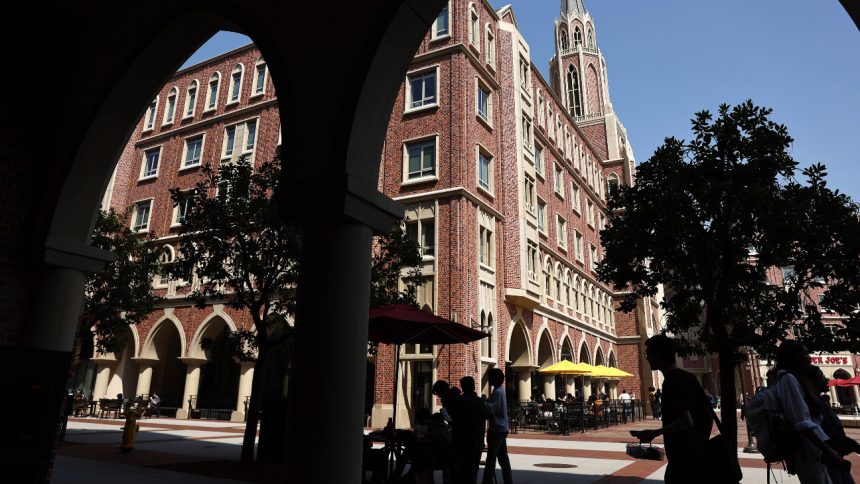Chinese Film Students Fret, Pursue Studies Elsewhere Amid U.S. Visa Uncertainties
A cinematic education in the United States had become a rite of passage for many contemporary Chinese filmmakers, but those days appear to be numbered amid the threats and mixed messages from the Trump administration.
Universities in the United Kingdom, Australia, Poland and the Czech Republic are now on their agenda, as well as those both in China and closer to home, including Hong Kong, according to students and academics in China who spoke to The Hollywood Reporter under conditions of anonymity given the sensitivity around the issue at home and in Trump’s increasingly repressive U.S.
The bellicose vows out of Washington to dig into the social media feeds of Chinese visa applicants — along with Secretary of State Marco Rubio saying two weeks ago that the U.S. government would “aggressively” revoke visas for the country’s citizens — have potential Chinese foreign exchange students, and even tourists, spooked.
President Trump last week appeared to walk back such threats, posting on social media that his administration had made a deal with China to allow students from the country to continue “using our colleges and universities.” But sources in China say they had long since changed their study and travel plans, given the deteriorating relationship between the two nations over the past decade.
While Chinese students already enrolled in U.S. courses were “obviously very mad” to find out their studies were in jeopardy, according to one Chinese student based there, a film studies academic at a Shanghai university said the attitude of those who had decided to stay in China for their studies was “quite stable.”
“Given their foreknowledge of the relationship between the two countries and certain U.S. policies, they had already planned to continue their studies at universities in other countries or to remain in China,” the academic said. “They do not appear to be particularly disheartened or disappointed.”
Being accepted by U.S. institutions had “already become difficult,” another academic said, pointing to film schools in Lodz, Poland and Prague in the Czech Republic as attractive alternative options. “[Students] started thinking about [those options] at the start of last year,” said the source.
While the exact number of Chinese students studying film in the U.S. is unknown, there were 277,000 Chinese students in total at U.S. colleges in 2024, while Chinese students contributed an estimated $14.3 billion to the U.S. economy in 2023, according to U.S. government data. The University of California has roughly 17,832 Chinese students across all of its campuses (UCLA has 2,208, while USC has nearly 6,000).
“An important part of all this is that international students contribute quite a huge amount to the economy,” another U.S.-based film student noted.
The preferred options for Chinese film students have traditionally included AFI, USC, NYU, Columbia and UCLA — according to one student currently enrolled in the U.S. — because “those names still hold a lot of weight.”
“I came to the U.S. because I wanted to experience a different educational system — one that offered structured, industry-level training — and I believed there would be better job opportunities in the American film industry after graduation,” the student said. “But now, due to tensions between the two countries, many people are starting to consider other destinations where English-language film programs are still available.”
Another U.S.-based Chinese film student said flip-flopping messages from Washington have left “nothing feeling certain.”
“The constant uncertainty makes it harder to plan for the future. I always knew studying abroad would come with challenges, but the current political climate adds an extra layer of unpredictability,” they said.
The issue has apparently forced changes to the summer travel plans of many Chinese students in the U.S., with some staying stateside “because they are afraid that there might be problems with their visa upon re-entry to the U.S.” Said another Chinese student in the States: “No one knows exactly what is going on and how things will develop.”
All of the U.S.-based students contacted by THR reported that their schools had issued general advice suggesting they cancel any plans for international travel over the summer, and to reach out if difficulties do arise.
“But honestly, I don’t think there’s much the school can actually do if something serious happens. It’s more of a precaution than a solution,” one student said.
Another was left worrying about future plans.
“I don’t feel welcome here, nor supported in my intention to keep working here after graduation,” said the student. “I feel like everything is getting harder and potentially is going to take way more resources than I’d expected. I was pretty positive about exploring opportunities here in the States after I graduate, but now I am seriously considering going back home — that is, if I am not deported for any reason prior to graduation.”


